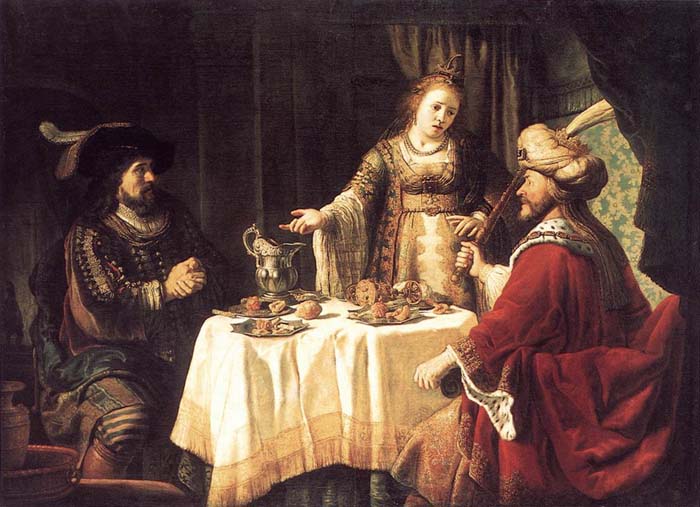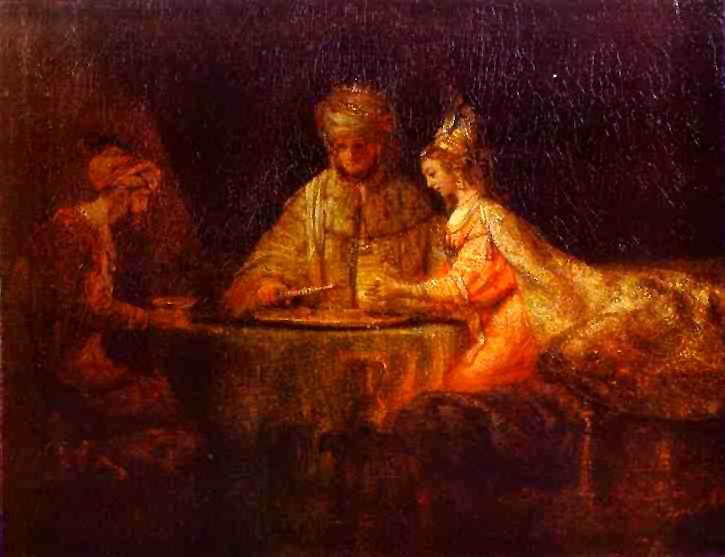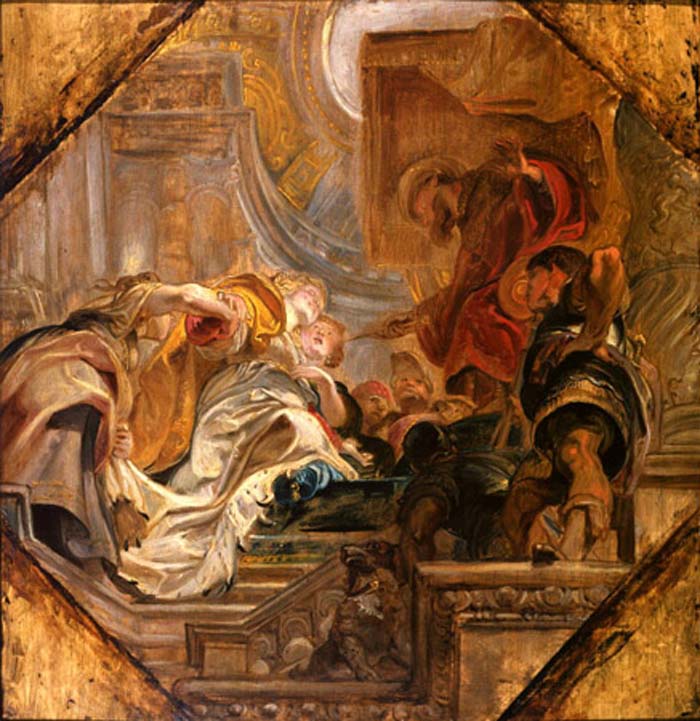
Thanks for visiting this page ... but this page is for Discipleship Group members.
If you are already part of a Faith, Hope, or Love Discipleship Group,
Login here.
If you are part of the free "Grace" Discipleship group, you will need to
Upgrade your Membership to one of the paid groups.
If you are not part of any group, you may learn about the various groups and their benefits here:
Join Us Today.

The tables are finally turned on Haman in Esther 7, when Esther reveals his plot to destroy all the Jewish people in Persia.

The book of Esther does not contain any references to God or prayer, or anything remotely spiritual. Nor is it quoted by any New Testament author. For that reason, many have said that since God doesn’t appear in the book, it shouldn’t be in the Bible. But we have seen as we have worked our way through that the main characters of the book were living in a time when many of them were asking, “Where is God?” and so it is only appropriate that the book does not mention God. He is there, but you have to look for him. Although He seems to be absent, His works are present everywhere.
And this is the way most of us live our lives. We often wonder where God is in our lives. If you ever wonder where God is, and what He is doing in your life, the book of Esther shows us how to see God in our lives, even when it seems He is not there. We will see today that God is often seen in the smallest details, but when all the details are added up, they become a colossal testimony to His presence and power at work in our lives.
This happens as Esther continues to work away at the “Mission Impossible” she was sent to accomplish. Some of her mission has been accomplished, but in Esther 7, she completes another part, facing down Haman, the king’s right hand man, while at the same time, not implicating the king in Haman’s crimes.
The Request of Esther (Esther 7:1-4)
Esther 7:1. So the king and Haman went to dine with Queen Esther.
Haman has just finished escorting Mordecai around the city, which was very humiliating for him, and now he is on his way to the banquet which he has been asked to attend. It is again a banquet of wine and dessert, and it will be just the queen, the king and himself. and probably, because of the day he has had, Haman is not the life of the party at this banquet. [1]
Now, as I mentioned in chapter 4, the king and queen did not normally dine together, and when they did, it was only for special occasions. Also, Persian kings were very protective of their wives, and normally only allowed eunuchs to interact with the women. So for Haman to be invited as a guest to such a meal was a special honor and privilege for him. [2]
But we don’t quite know what he is thinking here. I’m sure before, he was very excited. But remember what his advisors and his wife Zeresh told him at the end of Esther 6? They said that since Mordecai was of Jewish origin, Haman would not be able to stand against him, and that Mordecai would be Haman’s ruin.
So Haman is probably wondering what else can go wrong today, but he figures he is safe since Mordecai will not be at this private banquet. But he does not know, as we do, that Esther is related to Mordecai.
Esther 7:2. And on the second day, at the banquet of wine, the king again said to Esther, “What is your petition, Queen Esther? It shall be granted you. And what is your request, up to half the kingdom? It shall be done!”
Esther has really played her hand right. Her timing is ideal. The king’s curiosity has peaked. He is now anxious to know what could be so important for Esther to not only risk her life, but also to host two banquets.
So this is the third time the king has asked Queen Esther what her request is. The first two times, we were hoping she would ask for the head of Haman, but now we see that her delay allowed Haman’s downfall to be complete. He has been publicly humiliated, and has built a gallows, and now maybe Esther will make her request to the king.
Now Esther has to be very careful here, she must somehow fully expose Haman, but at the same time never appear in any way to be bringing out any charges against the king. [3] Let’s see how she does this.
Esther 7:3. Then Queen Esther answered and said, “If I have found favor in your sight, O king, and if it pleases the king, let my life be given me at my petition, and my people at my request.”
So she asks! And she uses the exact phrases that the king used, “What is your petition? What is your request?” “This is my petition. This is my request.”
Notice that she has carefully thought through this question. She does not immediately point a finger at Haman and say, “I want him killed!” as we expect. This would have accomplished very little, for there was still an edict out for the annihilation of the Jews on a certain date about one year from now. In fact, that is what Esther says in verse 4.
Esther 7:4. “For we have been sold, my people and I, to be destroyed, to be killed, and to be annihilated. Had we been sold as male and female slaves, I would have held my tongue, although the enemy could never compensate for the king’s loss.”
It is not a wise thing to disturb the king. Making a king upset would often cost the person their life. But she uses powerful pleading here. This is rhetoric, as she heroically unites herself with her people.[4]
And notice she does use the world “sold.” Again we are reminded of the bribe of money Haman used to get what he wanted.
Now Esther, and ourselves as readers, should be a little apprehensive at this point. We know a little about this king, and we do not know if he will grant Esther her request. It is quite possible he will fly into a rage and demand that she be deposed as he had done with Queen Vashti.
But the king asks the logical question in Esther 7:5.
The Fall of Haman (Esther 7:5-10)
Esther 7:5. So king Ahasuerus answered and said to Queen Esther, “Who is he, and where is he, who would dare presume in his heart to do such a thing?”
This verse loses a lot of force in the translation from Hebrew to English. If it were to be read in Hebrew, it comes across with the force of machine gun fire.
His honor is offended that someone would attempt injury to his queen and her people. [5]
Remember, neither the king or Haman knew that Esther was Jewish. So it probably hadn’t quite clicked yet in their minds what she was talking about. It is clear that he has no memory, at least not at the moment, of Haman’s plot against the Jews or of his own part in it. So, with marvelous irony, he asks for both the identity and the whereabouts of the man who would dare do this, completely unaware that he is reclining at the table with him. [6]
Esther has to be very careful what she says. The king has just asked, “Who is he who would do such a thing?” Esther’s first thought may have been, “What do you mean, ‘Who is he?’ You were there! You yourself signed the law!”
But Haman is really the one behind all of this, and the king was just a pawn in Haman’s plot, and so in verse 6, she finally accuses him.
Esther 7:6. And Esther said, “The adversary and enemy is this wicked Haman!”

So Haman was terrified before the king and queen.
Esther’s response follows the same pattern as the king’s question. In the Hebrew, the words ring out in staccato cadence. A literal translation from the Hebrew would read, and we can just imagine her jabbing her finger at Haman with every word: “A man hateful and hostile! This wicked Haman!” [7]
With these words, Haman’s world comes crashing down. This very morning he had been on top of the world, and now it appears he will lose his life. It is very possible that he attended the banquet in hopes that it would bring back some of his lost dignity. But when he hears these words from Esther, the text says he was terrified.
She uses three strong words to describe Haman before she ever mentions his name. The adversary and enemy is this vile (or wicked) Haman. In view of all that Haman has done, this is not an overstatement. [8]
Esther 7:7. Then the king arose in his wrath from the banquet of wine and went into the palace garden; but Haman stood before Queen Esther, pleading for his life, for he saw that evil was determined against him by the king.
The king gets up in a rage, which is probably an understatement, and leaves the room.
Now, Esther has made her request, but we do not yet know what the king’s answer will be. And this is a very tense moment while the king is gone. Esther has just said that Haman was the man responsible, but remember, it was really the king himself who allowed the law to be made and the edict to be proclaimed. So although Esther pointed to Haman, it really pointed to the king as well. [9]
This might be partly why the king was angry. He was angry at himself. But also, he might be trying to think of a way out of this. He likes Haman. Haman is his top advisor. Haman is the second in command in the whole nation, it is like he is the vice president. I am sure the king does not want to put Haman to death. They are friends.
And also, there is the matter of the Persian Law. Laws were irreversible. The king was probably wondering how to get himself out of this mess without killing Haman and without killing his wife. So he is out pacing around in the garden trying to think through all of this, trying to figure out what to do.
Can he punish Haman for a plot that went public in the kings own name? Remember, it was Haman’s plot, but the king put his name to it. If he puts Haman to death for a plot the king himself approved, won’t he also have to admit his own role in the fiasco? [10] Well, we don’t know how long the king was gone, but when he returns in verse 8, the dilemma is solved for him with an amazing “coincidence.”
Esther 7:8. When the king returned from the palace garden to the place of the banquet of wine, Haman had fallen across the couch where Esther was. Then the king said, “Will he also assault the queen while I am in the house?” As the word left the king’s mouth, they covered Haman’s face.

We really have to laugh at Haman. The cards were stacked against him today.
Here’s another set of coincidences, right? We saw seven coincidences back in chapter 6. Here’s another one of these tiny miracles from God. While the king is out deliberating on what to do about Haman, the Jews, and Esther, Haman is inside pleading with the queen for his life.
Initially, it was just the three of them at the banquet table, but now the king has gone out to think. Also remember that kings normally did not let anyone come into contact with their wives except the royal eunuchs. The kings were afraid that other men might try to take advantage of the beautiful women. In fact they had a law that if ever a man was allowed into the harem, he was not to be allowed within seven steps of any woman. [11]
So the king is gone, leaving just Haman and the queen, and Haman is pleading for his life. But while he does, Haman falls on the couch where Ether was reclining! For Haman to do this is so unthinkable that an ancient Aramaic commentary even says that the angel Gabriel shoved Haman onto the queen’s couch! [12]
It is really not a smart thing for Haman to do, but just as he does this, another major “coincidence” here occurs: the king walks back into the room!
And the king thinks that Haman is trying sexually assault Esther. See his question: “Will he even molest the queen while she is with me in the house?” Whatever he had decided while in the garden, he has definitely made his decision now. The quandary of what to do about Haman is solved. Haman must be killed, and he can be killed for assaulting the queen, which keeps the king’s reputation intact. Haman has put the nails on his own coffin.
So the attendants cover Haman’s face, and this is simply a sign of death.
Esther 7:9. Now Harbonah, one of the eunuchs, said to the king, “Look! The gallows, fifty cubits high, which Haman made for Mordecai, who spoke good on the king’s behalf, is standing at the house of Haman.” Then the king said, “Hang him on it!”
We also see the barbarity of Haman. He not only wanted to kill Mordecai, we see that since he built the gallows by his house, maybe even in his yard!, he also wanted to witness Mordecai impaled on that gallows. So instead of getting up in the morning and enjoying the sunrise, Haman wanted to get up in the morning and drink his coffee while gazing at the body of Mordecai impaled 75 feet in the air. Haman was a very cruel person.
And probably, this cruelty had gained many enemies for Haman in the court. Harbona here might be one of them. See how quickly Harbona speaks up! He tells the king about the gallows that Haman built, and not only that, says Harbona, Haman built it to hang Mordecai on it, whom you honored just this morning!
Harbona fails — maybe intentionally (because remember in chapter 4, he is the only one who knows the whole story) — to notify the king that Mordecai and Esther are related, and that Mordecai not bowing to Haman is what brought about these events. But the king concludes that since Haman wanted to hang the man that had saved the kings life from an assassination attempt, then maybe Haman had sympathies with those who tried to assassinate him. [13]
This enrages the king more, and he orders that Haman be hung on the gallows instead immediately. This is the irony of ironies! Remember when I told you that although Haman built the gallows, it was actually God who needed them? Here is why. God used the unrighteous intentions of a very wicked man to accomplish his divine and holy will. He who lives by the sword, dies by the sword, and he who builds the gallows, dies on the gallows.
Esther 7:10. So they hanged Haman on the gallows that he had prepared for Mordecai. Then the king’s wrath subsided.
Haman is killed, and we can breath a sigh of relief. The tables have been turned, but the story is not over yet. There is still a major problem. The kings edict to eradicate the Jews was still in effect. There was still a Persian decree that would slaughter many innocent people because of the wicked actions of a now dead man![14]
This irreversible law, which was to annihilate the Jews, had already gone throughout the land. There was no taking it back. There was no reversing it. And so now God must work things out to protect His people. We will see how this is done in chapters to come.
It is like a poet has said:
The mills of God grind slowly,
but they grind exceedingly small;
With patience he stands waiting,
but with exactness grinds He all.
God does not leave anything undone, and he will take care of all the details, but we will have to wait to see how this is done.
Conclusion to Esther 7
Esther 7 then, is a lesson about two types of people. About who gets life and who does not. It is a lesson about divine providence on the righteous and divine retribution on the wicked. It is a about blessing being given to the people of God and judgment on the people against God. Ultimately the righteous will win, and ultimately, the wicked will be destroyed.
When God works in the life of the righteous, He is very skilled in what he does. It is like watching a master carpenter build a cabinet, or a master chef chop vegetables. It seems easy …until you try it.
God is like that here. It is a wonder to behold his works, and see how He skillfully manipulates the strands of time and the threads of human life and history to carefully weave his purpose and accomplish his goals. It is obvious in Esther.
But it is not so easy to see God’s hand at work in our lives. We watch these Bible characters live their lives, and we think that it was easy for them to trust God. We think that because they are in the Bible, they must have had this great faith in God, which helped give them confidence in the severest trial.
But we say think that it is harder for us to trust God. Due to the stress and pace of life it is hard to see where God is working and what he is doing. If that is how you feel, God’s work can often only be seen through the eyes of faith. And so how can we see God at work? I have only one suggestion. If you want to see God at work in your life, you have to begin looking for Him. You have to develop eyes of faith.
Here is one way how. Let you spouse, or a friend, or myself as your pastor know that you are looking for God. Then, every morning when you get up, let God know through prayer that you are watching for him that day as well. Then, keep your eyes, and your heart and your mind open!
I guarantee you that if you do these things, God will show you how he is working tiny miracles in your life. My wife, Wendy, likes to call them “kisses from God.” Us men might prefer “slaps on the back.” Then, when you see God’s hand at work, let whoever you told know where and how God is working in your life. It will be a faith-growing experience for both of you as you see the Master-Craftsman providentially working in your life. They may not be big things you see. Maybe just little, tiny miracles, which some people might call coincidences.
But as you go through life, these tiny miracles add up, like little grains of sand, until many years from now, you have millions and billions of grains of sand, and you look back at your life, and see miles and miles of gleaming white beach. This is how to develop eyes of faith as a Christian, and see God at work in your life.
Of course, if you are not a Christian today, you have a different problem. Just as it is certain that God’s providence will come upon the righteous, so also is it certain that his retribution and judgment will come upon the wicked, as it came upon Haman.
Most of us don’t think we’re as bad as Haman, and we’re right — we’re probably not. We don’t have plans to kill and massacre millions and millions of people. And so some of us think that since we’re not as bad as Haman, we don’t have anything to worry about.
But God says in James 2:10 that even if somebody keeps the whole law, and yet stumbles at just one point, they are guilty of breaking all of it. So it doesn’t matter, from God’s perspective, if you sin ten million times, or just once. Either way, you are a sinner. And it doesn’t have to be a “big” sin, but can be a single lie, or one time cheating on your taxes, or one lustful thought, or stealing one thing from work. A sin is a sin, and one sin makes you a sinner, and God does not let any sinners into heaven.
So all of us are doomed. But God loves us, and so has provided a way for sinners to get into heaven. This way is through Jesus Christ. God promises us, that even though we are sinners, we can have everlasting life if we believing in Jesus Christ for it.
You don’t have to become righteous on your own — for no one can do that. Christ, who was righteous, became sin for us, so that all who believe in Him, might gain His righteousness as a free gift.
If you have not believed in Jesus, I would encourage you to do so today, before it is too late. Before you too, become like Haman.
Notes on Esther 7/strong>
[1] Deffinbaugh, 8.
[2] Missler, 51.
[3] Bush, 431.
[4] Missler, 59.
[5] Jobes, 165.
[6] Bush, 432.
[7] Jobes, 165.
[8] Armerding, 83.
[9] cf. Armerding, 83.
[10] Jobes, 165.
[11] Jobes, 165.
[12] Jobes, 165.
[13] Jobes, 166.
[14] Missler, 61.
Want to Learn More?
Read other sermons on Esther:
Download the Audio File for this Sermon

Thanks for visiting this page ... but this page is for Discipleship Group members.
If you are already part of a Faith, Hope, or Love Discipleship Group,
Login here.
If you are part of the free "Grace" Discipleship group, you will need to
Upgrade your Membership to one of the paid groups.
If you are not part of any group, you may learn about the various groups and their benefits here:
Join Us Today.



Leave a Comment or Question